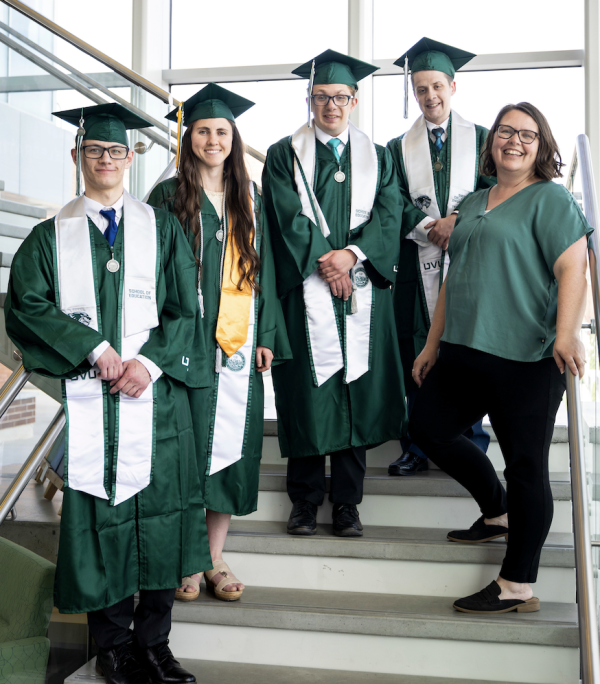She is the latest graduate of Syracuse University’s InclusiveU program, which serves students with intellectual and developmental disabilities.
Although the number of students with disabilities enrolled in higher education institutions is increasing every year, they still face barriers to obtaining credentials and certifications. According to a report released in May by the U.S. Government Accountability Office, only 21 percent of students with disabilities graduate from college, compared with 38 percent of students without disabilities.
The University has created special programs to facilitate access to higher education for students with intellectual and developmental disabilities and provide comprehensive support for their unique needs.
Here are four examples of programs that provide neurodiverse learners with certificates, peer support, and opportunities for engagement on campus.
Most popular stories
Most Popular
Wolverines Elevation: Utah Valley University
Thanks to a $1.9 million grant from the U.S. Department of Higher Education, Utah Valley University launched a three-year certificate program for young people (ages 18 to 25) with intellectual disabilities in 2021. UVU graduates its first four students in spring 2024.

The first graduating group of Utah Valley University’s Wolverines Elevated program for students with intellectual disabilities.
Students who complete Wolverines Elevated (WE) earn a certificate in integrated college and community studies that includes coursework on self-determination, independent living and career development. WE students can also earn a second certificate from any course offered at the university.
As part of the program, students are assigned a peer mentor to help coach student success skills like time management and course management, as well as help them navigate Canvas and connect to campus resources. Students can also develop professional skills through work experiences and internships on campus or in the community.
InclusiveU: Syracuse University
At Syracuse University, students with intellectual and developmental disabilities can participate in a four-year program in which they can earn a certificate in their field of interest by declaring a major, auditing inclusive classes and electives, and completing internships across campus. InclusiveU is a long-standing program at the university that is known nationally for serving large numbers of students.
The program enrolls over 100 participants each year, and learners are invited to participate in all that the campus has to offer.
“Our students are integrated into campus life,” says Brianna Schultz, director of InclusiveU. “Our students take regular SU classes, live in on-campus dorms with their peers, and participate in on-campus social events.”
Students without disabilities serve as campus mentors, helping with note-taking, study techniques and other support during class.
Participant feedback highlights that participants gain independence, increase self-confidence, and feel a sense of belonging on campus. Graduates seek competitive, full-time employment.
Life Skills: Coastal Carolina University
Living on campus can be a college student’s first step in learning to be independent, and the same is true for students with disabilities: CCU offers a four-year, non-degree program called LIFE, modeled after CarolinaLIFE, first introduced at the University of South Carolina in 2008, for students with mild to moderate intellectual or developmental disabilities.
Throughout the program, students receive academic guidance and support in vocational education, life skills, and community activities. Unique to this program is its on-campus residence halls. Students are housed in four suites and 13 apartments, with 13 residence hall support staff to assist with their individual needs. Students are also given the option to live independently off-campus when possible.
Program participants have access to all campus activities, including CCU courses, on-campus housing, student organizations, sporting events, work-study, graduation, etc. LIFE students also receive a $10,000 scholarship regardless of need, and a grant of $7,500 to $10,000 each year based on need.
All advanced students in the program participate in an internship of 30 hours per week and gain 900 hours of work experience in two to three jobs throughout the year. For the past three years, 100% of LIFE graduates have been employed within nine months of graduation.
CCU saw its highest participation rate ever for the fall 2023 semester, welcoming 17 first-year students.
Colleagues: Boise State University
PEERS, a comprehensive two-year higher education program at Boise State University for students with intellectual disabilities, graduated its first group of students in May 2023 with a Community and Career Readiness Certificate.
Participants in PEERS (which stands for Providing Exceptional Education and Raising Standards) are enrolled in coursework at Boise State University for credit or audit, as well as taking PEERS-specific courses that are pass/fail rated.
As part of their coursework, students complete paid or unpaid work experience on or off campus for at least six hours per week during their final three semesters, and three of the Class of 2023 graduates worked at the Boise State Recreation Center during their certification.
Graduates of the program said they learned to budget, ask for help and stay calm each day.
We are focusing on student success and are inviting stories from campus leaders, faculty and staff to share here.
